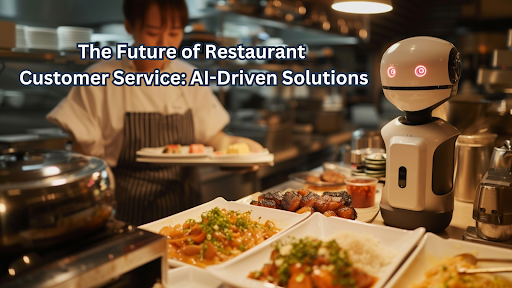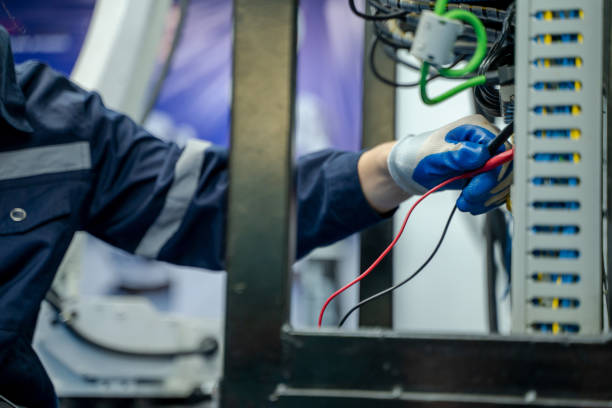Imagine walking into a restaurant and being greeted not just by a friendly face, but by an AI system that knows you. Instead of waiting for a server to take your request, this smart system already remembers what you usually like to eat and can even suggest new dishes based on your past preferences. It may sound like a scene from a sci-fi movie, but this is quickly becoming a reality.
AI is revolutionizing restaurant customer service by making it faster and more personalized. AI systems can analyze customer preferences and feedback to improve service and create a more enjoyable dining experience. According to a Forbes Advisor poll, 64% of companies believe artificial intelligence will increase their overall productivity.
In this article, we’ll explore how these AI-driven tools are changing the way restaurants operate. Get ready to see how the future of restaurant service is shaping up with these exciting new technologies!
How is AI used in food service?
AI is enhancing food service in several significant ways. It predicts busy periods, helping restaurants manage inventory more efficiently and reduce waste. By analyzing customer preferences, AI can suggest meals that customers might enjoy based on their past choices.
AI also provides a valuable AI answering service for restaurants, using chatbots to answer questions and handle bookings, providing quick and accurate responses. Additionally, AI optimizes delivery routes to ensure food reaches customers as quickly as possible.
Revolutionizing Customer Interactions Through AI
AI is changing customer interactions by providing instant, personalized support through chatbots and virtual assistants. It uses data to tailor responses and handle queries 24/7, enhancing service efficiency and customer satisfaction. Let’s dive into the details.
Chatbots and Virtual Assistants: Your 24/7 Digital Guide
Imagine having a knowledgeable assistant available round-the-clock to handle customer queries, take reservations, and offer menu recommendations. That’s exactly what AI-powered chatbots and virtual assistants bring to the table.
These digital assistants are revolutionizing customer interactions. They can manage customer inquiries, freeing up human staff for more complex tasks.. Moreover, AI-driven voice recognition can accelerate drive-thru processes, significantly improving service speed.
| Do you know?
65% of consumers are comfortable using AI for food and drink services, showing growing acceptance of this technology. |
Personalized Recommendations: Tailoring the Dining Experience
AI gets to know your customers’ preferences and habits. This personalization results in a more tailored and enjoyable dining experience. Furthermore, customers are eager for personalized deals, which AI can deliver based on individual preferences.
Perhaps most impressively, personalized recommendations can boost customer spending, encouraging diners to explore new dishes and spend more.
Improving Customer Experience with Predictive Analytics
AI’s ability to analyze vast amounts of data allows restaurants to predict customer behavior with incredible accuracy. This predictive power allows restaurants to prepare for busy periods and manage inventory efficiently, with AI systems capable of forecasting daily and weekly sales.
During peak hours, AI-driven dynamic pricing can boost revenue by optimizing profits during high-demand times.
Additionally, AI-driven insights can improve seating efficiency, leading to faster table turnover, more satisfied customers, and increased revenue.
Optimizing Service Delivery
By anticipating peak times and customer flows, AI helps restaurants maintain top-notch service even during their busiest hours.
This proactive approach ensures that staffing levels are adjusted to meet demand, wait times are minimized, and customer satisfaction remains high during service periods.
Improved Menu Offerings
AI analysis of customer preferences and feedback allows restaurants to continuously refine and improve their menu offerings. By identifying popular dishes, restaurants can highlight fan favorites and adjust stock accordingly.
AI also helps identify emerging trends, enabling restaurants to introduce new menu items that align with customer preferences. Furthermore, AI-driven insights can optimize pricing, identifying the sweet spot that maximizes both sales and customer satisfaction.
Streamlining Operations with AI-Powered Management Systems
Minimizing Waste, Maximizing Availability
AI-driven inventory management is a game-changer for restaurants. Real-time monitoring and predictive analytics can reduce food waste, leading to significant improvements in cost savings and sustainability
Moreover, these systems can automate restocking when supplies run low, maintaining optimal inventory levels without constant manual oversight
Demand Forecasting: Stay Ahead with Accurate Predictions
By using historical data and market trends, AI enables restaurants to stay ahead of the curve in terms of demand. This foresight allows restaurants to accurately predict daily and weekly sales, helping them confidently plan resources and staffing.
AI can also anticipate seasonal fluctuations, enabling restaurants to prepare for holidays and special events well in advance.
AI-Driven Personalization and Customer Loyalty Programs
AI enhances customer loyalty through personalized marketing strategies. Personalized messages resonate more with customers, driving higher response rates and increased engagement.
Making Every Customer Feel Special
AI-powered loyalty programs can create custom rewards based on individual customer preferences and behaviors.This level of personalization increases program participation by offering rewards that truly matter to each customer.
By tailoring incentives to individual preferences, AI-driven loyalty programs can boost customer lifetime value, encouraging long-term loyalty and deeper engagement with the restaurant.
Building Stronger Relationships
The power of AI-driven personalization is clear in its impact on customer engagement. Restaurants implementing AI-driven personalization have seen improvement in customer satisfaction scores, as personalized experiences lead to happier customers.
This increased engagement leads to more repeat business, as customers are more likely to return when they feel understood and valued. Additionally, personalized recommendations often lead to exploration of new menu items, increasing the average spend per customer.
Need for AI in Restaurant Customer Service
The growing need for AI in restaurant customer service arises from the demand for faster, more personalized experiences, coupled with the need to streamline operations and manage costs efficiently. Here are some needs listed below.
- Increased Customer Expectations: Modern diners expect fast, personalized, and efficient service, which AI can help deliver.
- Operational Efficiency: Restaurants need to streamline operations to handle high volumes and manage resources effectively.
- Labor Shortages: With a shortage of skilled labor, AI can help fill gaps by automating tasks and reducing the reliance on human staff.
- Cost Management: AI helps control costs by optimizing inventory, reducing waste, and improving accuracy in billing.
- Enhanced Competition: To stand out in a competitive market, restaurants use AI to offer superior customer experiences and stay ahead of trends.
- Data Utilization: AI leverages data to provide insights that improve decision-making and service quality.
- Consistency: Ensures a consistent level of service across multiple locations, maintaining quality and customer satisfaction.
FAQs
1. Does KFC uses AI?
Yes, KFC uses AI to optimize its supply chains and enhance customer experiences. They also employ AI for analyzing customer data and personalizing marketing efforts.
2. How can AI help with good safety?
AI can enhance food safety by monitoring temperature and hygiene conditions, predicting potential contamination risks, and analyzing data for trends in foodborne illnesses. It also assists in automating inspections and ensuring compliance with safety standards.
3. Can AI replace chefs?
AI cannot fully replace chefs, but it can assist with tasks like recipe development, cooking precision, and inventory management. Human chefs remain crucial for creativity, taste, and the nuanced decision-making that cooking requires.
Ready to Dine With AI Service?
The future of restaurant customer service is undoubtedly intertwined with AI-driven solutions. From personalized experiences to streamlined operations, AI is transforming every aspect of the dining industry. While challenges exist, the potential benefits in terms of customer satisfaction, operational efficiency, and revenue growth are too significant to ignore.
As we move forward, restaurants that embrace these technologies will likely gain a competitive advantage, offering superior customer experiences while operating more efficiently and profitably. The integration of AI into restaurant operations is not just a technological upgrade; it’s a fundamental shift in how restaurants interact with and serve their customers.


